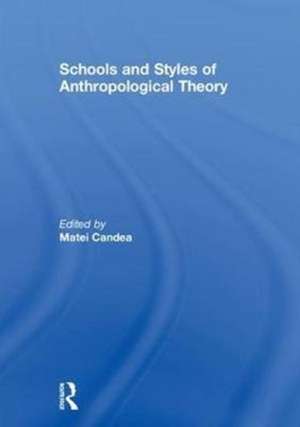Schools and Styles of Anthropological Theory
Editat de Matei Candeaen Limba Engleză Hardback – 23 ian 2018
Each chapter provides a thorough yet engaging introduction to a particular theoretical school, style or conceptual issue. Together they build up to a detailed and comprehensive critical introduction to the most salient areas of the field. The introduction reflects on the substantive themes which tie the chapters together and on what the very notions of ‘theory’ and ‘theoretical school’ bring to our understanding of anthropology as a discipline.
The book tracks a core lecture series given at Cambridge University and is essential reading for all undergraduate students undertaking a course on anthropological theory or the history of anthropological thought. It will also be useful more broadly for students of social and cultural anthropology, sociology, human geography and cognate disciplines in the social sciences and humanities.
| Toate formatele și edițiile | Preț | Express |
|---|---|---|
| Paperback (1) | 281.49 lei 3-5 săpt. | +23.48 lei 4-10 zile |
| Taylor & Francis – 24 ian 2018 | 281.49 lei 3-5 săpt. | +23.48 lei 4-10 zile |
| Hardback (1) | 1000.27 lei 6-8 săpt. | |
| Taylor & Francis – 23 ian 2018 | 1000.27 lei 6-8 săpt. |
Preț: 1000.27 lei
Preț vechi: 1219.84 lei
-18% Nou
Puncte Express: 1500
Preț estimativ în valută:
191.46€ • 208.04$ • 160.93£
191.46€ • 208.04$ • 160.93£
Carte tipărită la comandă
Livrare economică 21 aprilie-05 mai
Preluare comenzi: 021 569.72.76
Specificații
ISBN-13: 9781138229716
ISBN-10: 1138229717
Pagini: 268
Ilustrații: 9
Dimensiuni: 174 x 246 x 16 mm
Greutate: 0.45 kg
Ediția:1
Editura: Taylor & Francis
Colecția Routledge
Locul publicării:Oxford, United Kingdom
ISBN-10: 1138229717
Pagini: 268
Ilustrații: 9
Dimensiuni: 174 x 246 x 16 mm
Greutate: 0.45 kg
Ediția:1
Editura: Taylor & Francis
Colecția Routledge
Locul publicării:Oxford, United Kingdom
Public țintă
Postgraduate and UndergraduateCuprins
Introduction: Echoes of a conversation 1. Severed roots: Evolutionism, Diffusionism and (structural-)functionalism 2. Structuralism 3. Marxism and Neo-Marxism 4. From Transactionalism to Practice Theory 5. Anthropology and History 6. From the Extended-Case Method to Multi-Sited Ethnography (and Back) 7. Cognitive anthropology as epistemological critique 8. Interpretive Cultural Anthropology: Geertz and his ‘Writing-Culture’ Critics 9. The Frankfurt School, Critical Theory and Anthropology 10. The Anthropological Lives of Michel Foucault 11. From ‘the body’ to ‘embodiment’, with help from phenomenology 12. Feminist Anthropology and the Question of Gender 13. No actor, no network, no theory: Bruno Latour’s Anthropology of the Moderns 14. The Ontological Turn: School or Style? 15. Persons and partible persons Marilyn Strathern
Recenzii
"In this highly original contribution, leading anthropological scholars from the University of Cambridge provide a new and compelling approach to the history of anthropological ideas.... With each chapter authored by different anthropologists at the University of Cambridge, one gets a powerful sense of the perspective of that important school and at the same time original individual contributions from well-known anthropologists on key themes or thinkers that have impacted anthropological thought over the years. Insightful, succinct but also consistently challenging, I expect that these essays will inspire students of anthropology for years to come."
Adam Reed, University of St Andrews, UK
"A useful antidote to the presentism of much current anthropological theorizing, this rich and variegated collection – which takes account of some of the deepest roots and freshest sprigs – especially reflects the influential view of the discipline from the venerable Cambridge tradition, which displays in these pages an impressively global and historically comprehensive reach."
Michael Herzfeld, Harvard University, USA
"Anthropological theory does not exist per se. It has been conceptualized and formulated on the basis of our own academic work, developing and sometimes changing substantially over the years and decades, influenced by very personal experiences, social settings and political constellations. In fact, theory is as much a product of time and space as it is the achievement of intellectual forebears. Likewise its reception and critique is subject to change and ongoing discussion. The authors of this book, junior and senior, offer broad contexts and detailed knowledge without hiding their personal views and sympathies. A truly committed introduction."
Magnus Treiber, LMU München, German
Adam Reed, University of St Andrews, UK
"A useful antidote to the presentism of much current anthropological theorizing, this rich and variegated collection – which takes account of some of the deepest roots and freshest sprigs – especially reflects the influential view of the discipline from the venerable Cambridge tradition, which displays in these pages an impressively global and historically comprehensive reach."
Michael Herzfeld, Harvard University, USA
"Anthropological theory does not exist per se. It has been conceptualized and formulated on the basis of our own academic work, developing and sometimes changing substantially over the years and decades, influenced by very personal experiences, social settings and political constellations. In fact, theory is as much a product of time and space as it is the achievement of intellectual forebears. Likewise its reception and critique is subject to change and ongoing discussion. The authors of this book, junior and senior, offer broad contexts and detailed knowledge without hiding their personal views and sympathies. A truly committed introduction."
Magnus Treiber, LMU München, German
Descriere
Each chapter in this textbook has been written to provide a thorough yet engaging introduction to one particular theoretical school and style. Beginning with an introduction which reflects on the substantive themes which tie the chapters together, the book ends with an afterword by Marilyn Strathern reflecting on broader themes in the use of history and anthropological concepts. Presenting a detailed and comprehensive critical introduction to the most salient areas of the field, this book is essential reading for all undergraduate students undertaking a course on anthropological theory or the history of anthropological thought.
